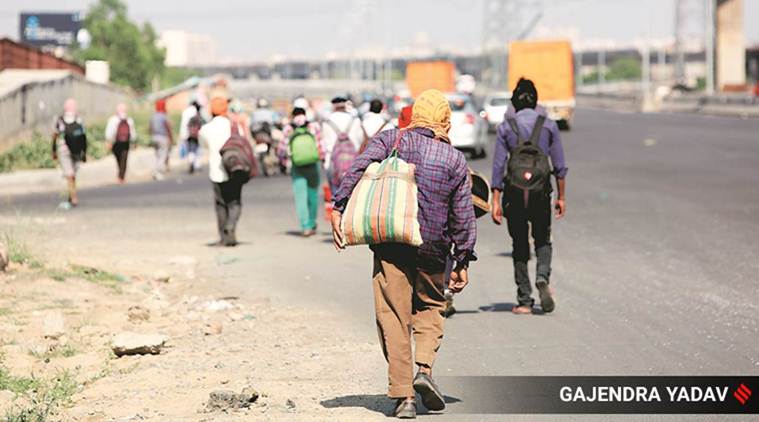 The paradoxical invisibility of migrants-as-workers until now, and their hyper-visibility on the highway today, has now been compounded by those state governments — UP, Gujarat, and Madhya Pradesh — that have exercised their freedom to suspend labour laws for 1,200 days. (File Photo)
The paradoxical invisibility of migrants-as-workers until now, and their hyper-visibility on the highway today, has now been compounded by those state governments — UP, Gujarat, and Madhya Pradesh — that have exercised their freedom to suspend labour laws for 1,200 days. (File Photo)
Of late, I have asked all the friends and relatives I speak to: Who is our Labour Minister? So far, no one has been able to recall a name or a face. That we heard very little directly from our health minister, Harsh Vardhan, during the worst pandemic of a century was curious enough. But the complete and virtual (pun intended) obliteration of Santosh Gangwar is curiouser still. It is a sign of labour’s beleaguered status that we have of late only a gaping void, after such greats as B R Ambedkar, Jagjivan Ram and V V Giri who served as labour ministers. All of them, especially the last, were closely associated with the Indian labour movement.
In a health crisis that has turned India into a home ministry-managed police-state, the chief function of the government has been to instil fear, not of the disease so much as of each other, especially of the poor and the minorities, despite clear evidence of COVID-19’s elite, international origins. As the policeman who beat the doctor on his way to surgery in Srinagar said, “This is the battle of police”. Therefore, what has been left unsaid by our political masters is far more important than the vapid statements in which we are drowned. Thus, we have seen a civil aviation minister, who, while announcing the “national priority” of opening up domestic air travel, invoked the long suffering “tax-payer”. We have heard from the railway minister, who as early as March 27, 2020 had a video conference with e-commerce giants to ensure smooth movement of “essential goods” throughout the country. His tearful anguish about migrant movement came nearly two months later. We have seen perhaps a little too much of the glowering finance minister. But from Gangwar, Minister of State of Labour and Employment with independent charge, we have not had a word.
The paradoxical invisibility of migrants-as-workers until now, and their hyper-visibility on the highway today, has now been compounded by those state governments — UP, Gujarat, and Madhya Pradesh — that have exercised their freedom to suspend labour laws for 1,200 days. Comfortably protected by the suspension of all politics as we knew it in these extraordinary times, state governments have seized the crisis as an opportunity. Gangwar silently presides over this dismantling, given the impossibility of protest from those whose forebears fought for these protections over the past century. Is it mere coincidence that the Kerala labour minister T P Ramakrishnan alone has stood firmly in support of worker rights and against bringing back forms of bonded labour?
The chief minister of Uttar Pradesh has revealed his administrative genius once again. Let us recall that unblinking claim during his campaign in Kerala in 2017 that the little southern state should learn from the UP healthcare model. (That the little southern state has today triumphed in its exemplary treatment of COVID-19 has been barely acknowledged by the Centre). Today, faced with the incontrovertible evidence that UP’s chief export, its labour force, can also return to its roots, however impoverished, the chief minister thought it fit to announce that other states will have to take his permission to employ people from UP. He backtracked from his statement two days later.
Article 19(1)(d) allows each of us the freedom to move throughout the territory of India with a sense of security assured by the state. We don’t yet have a Right to Work, but this freedom of movement ensured that we can seek work where it is found, or leave it at will. Reading this news reminded me not only of the suffering millions whose images have only just been replaced by the woes of airline travellers. It reminded me of the legions of migrants that make up my family. My father, who migrated from Palghat to Madras and then Bangalore, via Salem, Erode, Colombo. My mother, who migrated from Ooty to Bangalore via Palghat following her marriage. Uncles streamed into our little house from the village, to find jobs, homes, brides, in that order. I too migrated between cities, from Bangalore to Madras, Calcutta, and finally Delhi. We were drawn to the city, not chased from the villages. The Constitution ensured that we needed no permission from any chief minister to make those moves. Nor have I — at least so far — needed to seek refuge from the city or flee the terrors of unemployment and hunger. What flashes up in this moment of danger is the migrant in ourselves, well masked by our privileged citizenship.
The writer teaches history at JNU